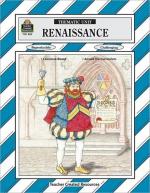|
This section contains 468 words (approx. 2 pages at 300 words per page) |

|
Aristotle, Poetics (350 B.C.E.)—Known only in fragmentary and corrupt versions until the late fifteenth century, the Poetics inspired a revolution in drama in Renaissance Europe. Aristotle outlined the classical forms used to stage plays in Greek, treated their underlying logic, and stressed that the drama was a living art form that needed to be performed in order to influence human passions.
Everyman (c. 1495)—Originally a dramatic interlude within the much longer morality play, The Castle of Perseverance, Everyman became one of the most popular of sixteenth-century plays. It relies on allegorical conventions to chart the progress of an everyday soul through the trials of this world and to final religious consolation. The first surviving manuscripts of the play were written in Dutch, but the text was popular and translated into many languages. It is still performed today.
Niccolò Machiavelli, The...
|
This section contains 468 words (approx. 2 pages at 300 words per page) |

|



